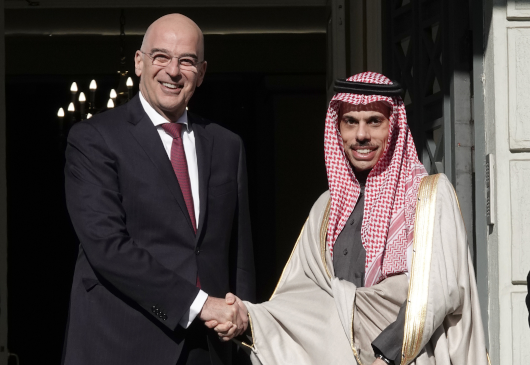 N. DENDIAS: Today, for the second time in about a month, I met with the Minister of Foreign Affairs of Saudi Arabia, Prince Faisal Al Saud. Thus, I had the opportunity to return the hospitality he extended to me on my visit to Riyadh on 17 December. This is one of the steps in our ongoing communication with the Kingdom of Saudi Arabia. As you have observed, our bilateral relations have taken on a special dynamic. And for Greece, for the Hellenic Republic, this is a strategic choice, given that Saudi Arabia is a very important country, not only on the Arabian Peninsula, but also in the wider region.
N. DENDIAS: Today, for the second time in about a month, I met with the Minister of Foreign Affairs of Saudi Arabia, Prince Faisal Al Saud. Thus, I had the opportunity to return the hospitality he extended to me on my visit to Riyadh on 17 December. This is one of the steps in our ongoing communication with the Kingdom of Saudi Arabia. As you have observed, our bilateral relations have taken on a special dynamic. And for Greece, for the Hellenic Republic, this is a strategic choice, given that Saudi Arabia is a very important country, not only on the Arabian Peninsula, but also in the wider region.
Today we talked about our bilateral cooperation, with special emphasis, of course, on the situation in Libya.
More specifically, with regard to Libya, our countries share the same concerns. We share the outlook that the two memoranda that were signed by Mr. Sarraj and Turkey, are null and void. They also pose a great danger to the situation in Libya and in the wider region. As Prime Minister Kyriakos Mitsotakis stressed in Davos yesterday, they are legally and geographically “preposterous.”
My Saudi Arabian colleague and I agreed to stay in touch and to work jointly as stabilising factors in the region.
Thank you very much.
REPORTER: Minister, how will the text from the Bundestag legal service on the memoranda be useful for us?
N. DENDIAS: First of all, this text serves to confirm our views. In other words, it says to the German legislative bodies, to the German government, to German public opinion, and to European public opinion, that these two memoranda are completely illegal, completely unacceptable and essentially null and void. But it also does something else. It highlights in the starkest manner their destabilising effect on security and stability in the region. They are not just two legal texts that are null and damaging. They create a destabilising reality. In this sense, the view of the legal service of the German Bundestag is another stone in the structure we are trying to build in order to convince international public opinion of how dangerous these activities are in our region.
REPORTER: One more question, if I may. We are seeing many statements and announcements from states and organizations that oppose and condemn the Turkish provocations in the Eastern Mediterranean and the Aegean. Nevertheless, Turkey is continuing its provocations. How are you dealing with this?
N. DENDIAS: Greece is not a country that is fighting Turkey. Greece is a country that supports peace, stability and the implementation of international law. And it will continue to do this. We would like to have a neighbour that is prosperous, a neighbour that shares our view of things, Europe’s view of things, and we will continue our moves in this direction. And we hope that, in the end, Turkey will come round to our way of seeing things.
January 24, 2020


